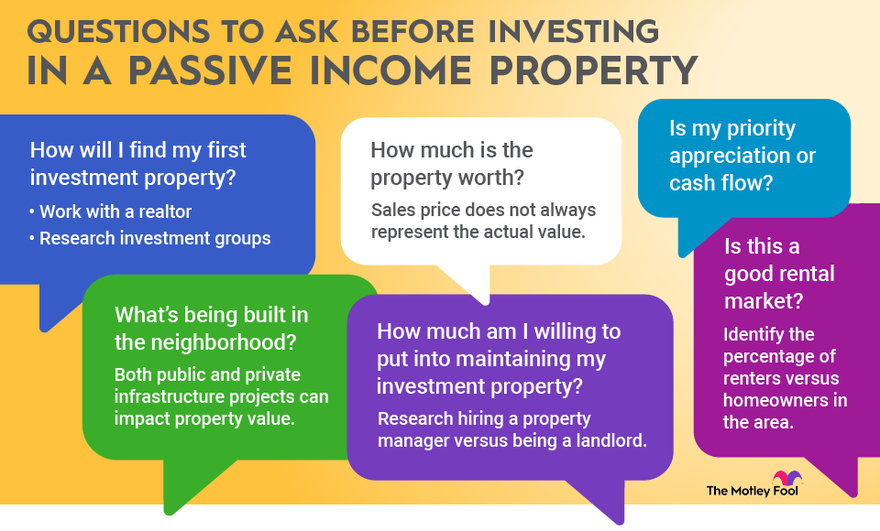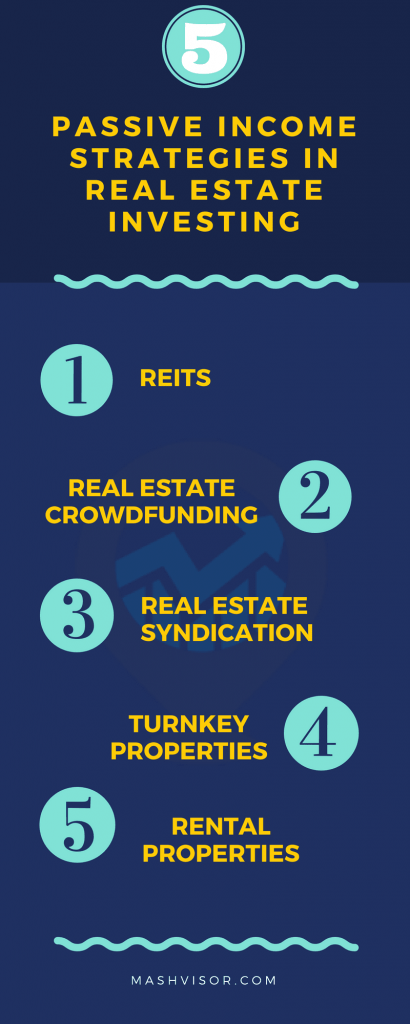To invest in real estate for passive income, buy rental properties or invest in Real Estate Investment Trusts (REITs). Both options offer steady returns and minimal active involvement.
Investing in real estate for passive income involves strategic planning and careful selection of properties or investment vehicles. Rental properties provide a tangible asset that can appreciate over time while generating monthly rental income. This method requires initial capital and ongoing property management.
Alternatively, REITs allow investors to buy shares in real estate portfolios, offering a hands-off approach with regular dividend payouts. Both strategies can diversify your investment portfolio and create a reliable income stream. By understanding market trends and evaluating risks, you can make informed decisions to maximize your real estate investment returns.

Credit: www.1031crowdfunding.com
Introduction To Passive Income Through Real Estate
Investing in real estate for passive income can be a game-changer. It provides a steady cash flow without constant work. Many people dream of earning money while they sleep. Real estate investment can make this dream a reality. Let’s dive into the benefits and differences between passive and active income.
Benefits Of Real Estate Investment
Real estate investment comes with many benefits. Here are a few:
- Steady Cash Flow: Rental properties provide monthly income.
- Appreciation: Properties increase in value over time.
- Tax Benefits: Deductions can reduce your tax liability.
- Diversification: Adding real estate reduces investment risk.
- Leverage: You can buy properties using borrowed money.
Understanding Passive Vs. Active Income
It’s important to understand the difference between passive and active income.
| Passive Income | Active Income |
|---|---|
| Earned with minimal effort | Requires continuous work |
| Rental income | Salary or wages |
| Royalties | Freelance work |
| Interest from investments | Consulting fees |
Passive income allows you to earn money even when not working. Active income requires ongoing effort and time. Real estate can be a great source of passive income. You earn rent while the property value rises. It’s a win-win situation.
Types Of Real Estate Investments
Investing in real estate for passive income is a great choice. There are different types of real estate investments. Each type offers unique benefits and challenges. Understanding these options helps you make informed decisions.
Rental Properties
Rental properties are a popular real estate investment. They provide a steady income stream. Here are some key points to consider:
- Residential Properties: These include single-family homes, apartments, and condos. Tenants pay rent monthly, offering consistent income.
- Commercial Properties: These include office buildings, retail spaces, and warehouses. They often have longer lease terms and higher rents.
- Vacation Rentals: Properties rented to travelers for short stays. Platforms like Airbnb make this easier.
Managing rental properties requires effort. You may need to handle repairs, find tenants, and collect rent. Hiring a property manager can reduce your workload.
Real Estate Investment Trusts (reits)
REITs are a way to invest in real estate without buying property. They are companies that own, operate, or finance income-producing real estate. Here are some reasons to consider REITs:
- Liquidity: REITs are traded on stock exchanges. You can buy and sell them like stocks.
- Diversification: REITs invest in various property types. This includes residential, commercial, and industrial properties.
- Dividends: REITs must pay out at least 90% of their taxable income as dividends. This provides regular income to investors.
Investing in REITs is less hands-on than owning property. It suits those who prefer a more passive approach.
Getting Started With Real Estate Investing
Investing in real estate can be a great way to earn passive income. Before diving in, it’s essential to understand the basics. This section will guide you through the initial steps of getting started in real estate investing.
Initial Research
Begin with thorough research. Understand the real estate market. Learn about different types of properties. Discover which locations are profitable.
- Read books on real estate investing.
- Follow real estate blogs and forums.
- Attend real estate seminars and webinars.
Research helps you make informed decisions. It reduces risks and maximizes returns.
Securing Financing
Financing is crucial for real estate investment. Secure your funds to start investing.
| Financing Option | Description |
|---|---|
| Traditional Mortgage | Get a loan from a bank. Requires good credit score. |
| Private Lenders | Borrow from individuals or groups. Flexible terms. |
| Hard Money Loans | Short-term loans with higher interest rates. Quick approval. |
Choose the financing option that suits you best. Ensure you can handle the repayments.
Calculate your budget. Include all potential expenses. This includes property price, maintenance, and taxes.
Tip: Keep an emergency fund for unexpected costs.
Strategies For Maximizing Returns
Investing in real estate for passive income can be highly rewarding. To achieve the best returns, adopting effective strategies is crucial. This section explores key strategies to maximize your returns.
Location And Market Analysis
Location is the cornerstone of real estate investment. Choosing the right area can significantly impact your returns. Here are some factors to consider:
- Proximity to schools and amenities
- Transportation links and infrastructure
- Neighborhood safety and crime rates
- Future development plans in the area
Conducting a thorough market analysis is equally important. Evaluate the following:
- Current property prices and trends
- Rental demand and average rental yield
- Economic stability and job market
- Comparative market analysis (CMA)
Property Management
Effective property management ensures your investment remains profitable. Consider hiring a property manager if you lack the time or expertise. Key responsibilities include:
| Task | Description |
|---|---|
| Tenant Screening | Find reliable and responsible tenants. |
| Rent Collection | Ensure timely rent payments. |
| Maintenance | Handle repairs and upkeep of the property. |
| Legal Compliance | Ensure property complies with local laws. |
Managing your property well can reduce vacancies and increase rental income. Creating a pleasant living environment can also lead to longer tenant retention.
Common Pitfalls And How To Avoid Them
Investing in real estate for passive income can be rewarding. Yet, many investors fall into common pitfalls. Understanding these mistakes can save money and stress. Below, we explore some frequent errors and how to avoid them.
Underestimating Expenses
Many investors only consider the purchase price. They ignore ongoing expenses. These can include:
- Property taxes
- Maintenance costs
- Insurance premiums
- Utilities
- Property management fees
To avoid this pitfall, create a detailed budget. Include all possible expenses. Use a spreadsheet to track costs. This will help you plan better.
Example Table:
| Expense Type | Estimated Cost |
|---|---|
| Property Taxes | $2,000/year |
| Maintenance | $1,500/year |
| Insurance | $800/year |
| Utilities | $1,200/year |
| Management Fees | $1,000/year |
Neglecting Tenant Screening
Choosing the right tenants is crucial. Bad tenants can cause many problems. These might include:
- Property damage
- Late payments
- Legal issues
To avoid these issues, conduct thorough tenant screening. Check references and credit scores. Use a detailed application form. Interview potential tenants if possible.
Here’s a simple checklist for tenant screening:
- Request a completed application form
- Verify employment and income
- Check credit history
- Contact previous landlords
- Conduct a background check
Following these steps ensures you select reliable tenants. This protects your investment.

Credit: www.fool.com
Long-term Growth And Diversification
Investing in real estate can provide long-term growth and diversification for your portfolio. Real estate often appreciates over time. Diversifying reduces risks and increases stability. Let’s explore strategies to achieve these goals.
Reinvesting Profits
Reinvesting profits can boost your long-term gains. Use rental income to buy more properties. This strategy compounds your earnings.
- Allocate a portion of profits to new investments.
- Improve existing properties to increase value.
- Consider different property types for variety.
Reinvesting ensures your money works for you. It helps in building a strong portfolio.
Expanding Your Investment Portfolio
Diversify your portfolio to spread risk. Invest in various property types.
| Property Type | Benefits |
|---|---|
| Residential | Steady income from rent |
| Commercial | Higher rental yields |
| Industrial | Long-term leases |
| Land | Potential for appreciation |
Investing in different regions also helps. Look for areas with growth potential. Consider both urban and suburban locations.
Expanding your portfolio can provide more stability. It also increases your chances for higher returns.
Follow these strategies for long-term growth and diversification. Your real estate investments will thrive.

Credit: www.mashvisor.com
Frequently Asked Questions
What Is Passive Income In Real Estate?
Passive income in real estate is earnings from rental properties, REITs, or real estate crowdfunding without active involvement.
How Do I Start Investing In Real Estate?
Start by researching market trends, setting a budget, and consulting with a real estate agent or financial advisor.
What Are The Best Real Estate Investment Options?
Popular options include rental properties, REITs, real estate crowdfunding, and short-term vacation rentals.
How Much Money Do I Need To Invest?
Initial investment varies; you might need anywhere from $5,000 for REITs to $50,000+ for property purchases.
Is Real Estate A Good Investment For Beginners?
Yes, real estate can be profitable for beginners if researched well and proper financial advice is sought.
What Risks Are Involved In Real Estate Investing?
Risks include market fluctuations, property damage, vacancy periods, and unexpected maintenance costs. Proper planning mitigates these risks.
Conclusion
Building a passive income through real estate is achievable with the right strategies. Start small, research thoroughly, and stay patient. Diversify your investments and seek professional advice when needed. Over time, you can enjoy a steady income stream and financial freedom from your real estate ventures.
Happy investing!

